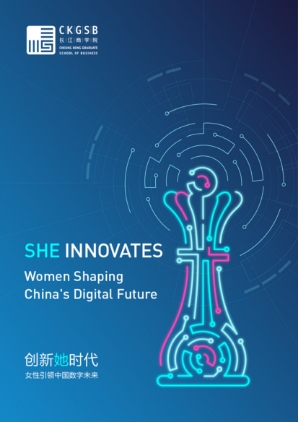For Lina Ayenew, education has always been a priority. Growing up in Ethiopia, though, she quickly realized that access could be patchy. In response, she founded Education for Ethiopia, a nonprofit with the goal of broadening access and improving engagement.
The organization makes use of digital technology to educate students in local languages, with lessons delivered through an app.
Now, she’s combining this passion project with her interest in China—using an MBA from Beijing’s Cheung Kong Graduate School of Business (CKGSB) to get the project off the ground.
The seeds for Lina’s fascination with China were planted while she was studying at Yale University. In the final year of her masters in public health, business administration, and management, she was keen to explore other geographies, and applied to the Yale-China program.
This program aims to bridge the knowledge gap between China and the US, through various exchange teaching exchange programs. During Lina’s time with the project, she taught a course on public health to medical students in Hunan province.
“Once I got to China and began studying Mandarin, I was hooked!” she says.
“China is very complex and I have found that many of its experiences in the last few decades show what to do and what not to do in various stages of development.”
She was so invested that when her teaching tenure ended she remained in China an additional year, working as a client executive with Burson-Marsteller in the PR giant’s Beijing office.
Lina’s fascination with China didn’t end when she moved home to Ethiopia. Here, she started work on her first book—a guide to learning Mandarin for speakers of Amharic, Ethiopia’s official working language.
The book was the first of its kind, and its popularity prompted Lina to think more deeply about Ethiopia’s education landscape.
“I began to reflect more deeply on the need to make educational content in local Ethiopian languages,” she recalls.
In Ethiopia, educational materials are written in English beyond seventh grade (ages 12-13), making it difficult for most students to access.
Issues like a high student-to-teacher ratio, and students’ responsibilities beyond the classroom also compound the problem.
These reflections, coupled with her long-term interest in China, culminated in Lina’s second book, The Complete Beginner’s Guide to China-Africa Relations.
At the same time, Lina realized that broader change was needed to improve access to education in Ethiopia. In response, she founded Education for Ethiopia.
To get the project off the ground, Lina knew that business school was the answer.
Hoping to develop her managerial skills, and better understand how to leverage EdTech, she returned to China once again—this time for an MBA.
China is a world leader in EdTech, and according to a study by education provider, Navitas, Beijing hosts the world’s largest EdTech ecosystem.or education reform
When it came to choosing a program in China, CKGSB was Lina’s first choice. The school’s robust alumni network, expertise in technology, and focus on social impact work quickly stood out, she recalls.
“I was also hoping to expand my network, and dip my toes into the EdTech space, in order to make digital education in low-resource areas like my country possible,” Lina adds.
At CKGSB, Lina has found ample support for her nonprofit. “They are interested in developing leaders who want to do well and do good,” she explains. “So sustainability is their focus.”
A particular highlight has been the school’s in-class incubation program. During this experience, students are challenged to refine and launch their business ideas.
“It has been great to have this launchpad for pitching and funding,” Lina reflects. “I was really challenged to find creative ways to make my organization run more efficiently and how to monetize without sacrificing the mission.”
At the same time, Lina’s CKGSB network is already coming into play. Her MBA classmate, Clement Jean, is joining Education for Ethiopia as chief technology officer.
“Clement found the mission so compelling that he quickly became a core team member,” she explains.
With his background in app development, Clement lends crucial skills to the EdTech side of the project, she adds.
With the MBA from CKGSB under her belt, Lina is confident she can drive Education for Ethiopia forward.
“I hope that the CKGSB network will provide life-long mentors, and that the lessons from CKGSB will lay the foundations for framing future business problems under the lens of sustainability,” she says.
By delivering Amharic-language content through an app, she believes that many of the barriers to learning she identified can be overcome.
“I hope my organization helps unlock my country’s human potential by providing access to STEM content and helping develop diverse talent,” she concludes.
This article was originally published on BusinessBecause

Read how women leaders are reshaping China’s digital economy, combining research on AI’s mental-health impact with profiles of seven entrepreneurs advancing semiconductors, healthcare, data centers, and AI marketplaces.